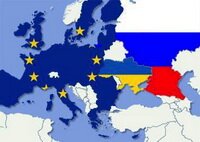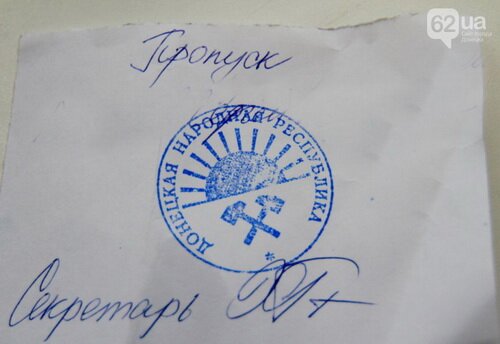
Assessing the current state of affairs concerning Ukraine, let's recall that in the Strategy of the National Security of Ukraine (edited by V.Yanukovych) “Ukraine in the changing world”, some of its developers predicted that potential sources of threats to national interests and national security of Ukraine could be “the crisis of the current and uncertainty of principles of the new system of international security, the erosion of the system of international agreements in the sphere of strategic stability, weakening of the role of international security institutions, which, in combination with the imperfect system of international law makes possible the use of force in the international arena in order to realize one's own interests; emergence of self-proclaimed quasi-state formations on the territory of sovereign states, emergence of dangerous precedents of recognition of some of these entities by other states, which [in Ukraine included] stimulated processes of regional separatism”. V. Putin and his environment have laid exactly these factors into the basis of the military scenario for the resumption of the global role of the Russian Federation and leveling internal Russian problems.
|
|
Various reports in the media and statements by competent foreign and domestic heralds (from the readiness of Russian troops to invade into the Eastern and Southern Ukraine to create a land corridor to the Crimea, to strike from the Crimea in order to capture Odessa or even to install a connecting corridor with Trans-Dniester through the territory of Ukraine and to achieve their goals within 3-5 days, to, allegedly, the beginning of returning the troops to their permanent deployment), as well as the actual situation on the Russian-Ukrainian border do not give grounds to reduce the assessment of the situation from the “extremely alarming” to the “signs of de-escalation of military threat”.
Moreover, there are reports on actual plans and measures to further destabilization of the socio-political situation in the south-eastern regions of our state up to the breakdown of the presidential elections on May 25 and implementation of the “Crimean scenario” in Donetsk, Luhansk and Kharkov regions.
Military build-up of NATO and the United States in the Baltic States, Romania, Poland and in the Black Sea may become a factor of sufficiency, which will hold back the Russian military
Foto http://www.belvpo.com/
|
|
From the military-political point of view we assume that Russia abstains from the decision of the military conflict directly with NATO, but it is testing the mechanism of collective defense and the decision making of the Alliance in response to the changing of the architecture of the security system in Europe. Military build-up of NATO and the United States in the Baltic States, Romania, Poland and in the Black Sea may become the factor of sufficiency, which will hold back the Russian military. But we should not ignore the information which circulated on the sidelines of the 9th “Ukrainian” UN Security Council meeting (March 28), that Russian President Vladimir Putin allegedly assured Ban Ki-moon that he had no intentions to invade the territory of eastern Ukraine, while cautioning that “the situation may evolve in such a way that it would force Russia to take actions”.
Besides, after the completion of priority measures concerning the accelerated integration of the Crimea into the politico-legal and economic space of the Russian Federation, Moscow plans to intensify its “economic war” with Ukraine. The formal reason for this may be Kiev's intended leaving the CIS. It is assumed that Russia will announce that the Free Trade Area within the CIS will not relate to Ukraine, nor will the Agreement on Rules for Determining the Country of Origin of Goods in the Commonwealth of Independent States (of 20 November 2009) . On this basis, the customs authorities of the Russian Federation will actually block the free export of Ukrainian goods because of its absence in the list of tariff preferences of the CIS, and will not accept certificates of the origin of goods (annual loss of Ukraine will be approximately 3 billion US dollars).
According to our estimates, the Kremlin's pressure on the Ukrainian authorities will be further explained by Kiev's not fulfilling the accepting agreements of February 21, of Foreign Ministers of the “Weimar Triangle”, primarily in terms of changes of the unitary state to a federal one, of the ethnic-language question and ensuring the legitimacy of the presidential election, which supposedly should be preceded by a constitutional reform/adoption of a new constitution. In other words, Russia will not recognize the presidential elections in Ukraine, unless they are preceded by an inclusive process of constitutional reform and referendum.

The seal of the “Donetsk People's Republic “
Foto http://oko-planet.su/
Moreover, Moscow plans to support the boycott of elections in eastern Ukraine and other forms of “people's protest”, which can be used for escalation of tension and as a pretext for intervention at the request of the local population/Russian minority, Russian-speaking and other communities, supposedly seeking to establish “Donetsk, Luhansk and Kharkov People's Republics”. Apart from such provocative actions, the Kremlin's “agents of influence” will inspire the resettlement of ethnic Greeks (into the Crimea, under the wing of the newly created “Russian senator” O. Kovitidi), Bulgarians (into Bulgaria), “oppressed” Russian-speaking (into the “better places of Russia”- for example, into “peaceful” Chechnya and North Ossetia) and so on.
Supporters of federalization of Ukraine announced about the creation of the Donetsk People's Republic
Foto http://podrobnosti.ua/
At this, to unwind anti-Ukrainian information campaigns and to inspire protest sentiments, in the East and South of Ukraine, the Kremlin strategists will rush to take advantage of the new Ukrainian government's faults caused by both, time pressure and deficit of competent performers (to which our European and American partners friendly point).
Here is meant, in particular, the delay of the constitutional reform (as we have already mentioned, Russia can use it as a reason to question the legitimacy of the current government and all that this government is trying to do or is doing); fulfillment by the Government of Ukraine of only three out of the 12 recommendations of the IMF (“what will be the consequences of the other nine for each family, if after the raising the gas price, 4.5 million Ukrainians expect a family disaster”); having not fulfilled 7 and poor fulfillment of 16 out of the 23 requirements of GRECO (“unwillingness to struggle against corruption”); having not solved a number of political-institutional and social problems of the Crimean Tatars (“the RF right now can guarantee their entry into power, giving the Crimean Tatar language the status of one of the state languages”). The list of other false “a la Kiselyov” accusations against the new Ukrainian government is virtually endless.
|
|
The Ukrainian government has to implement anti-crisis measures in the complicated external and security conditions. Despite the stated tough position of the USA, UK and NATO, it is obvious that the West, permanent members of the UN Security Council have not taken the required number of measures to counter the established by the Russian Federation new “standard” of aggressive behavior of a great state concerning territorial changes, and quite sensitive for the European economy consequences of possible introduction of economic sanctions against Russia. “Boomerang of the third phase” requires careful calculations and time, which the EU may not have due to lack of evidence of de-escalation on the Ukrainian border on the part of Russia. Moreover, as rightly pointed out former Presidential Adviser Andrei Illarionov, V. Putin faces a choice — to continue the offensive in the South and East of Ukraine, to seek the election of the pro-Russian candidate/to disrupt the presidential elections on May 25, or “to stop and digest what he has swallowed".
According to Poroshenko, Ukraine's economy is destroyed. Revenue retailers in the past month decreased by 32 percent, people refuse to purchase because they have no money. Besides, now there is a delay on the expenditure side of the budget heading, the revenue side of the budget is not being fulfilled, and there is a threat of the country's falling apart
Foto http://en-ua.com/
As for the head of the Russian state the position of a defender actually equals the defeat in terms of failure to achieve the set earlier goal to swallow Ukraine, and the pro-Putin candidate has no chances to win, he will rely on keeping a permanent threat of restarting military aggression, not recognizing the legitimacy of the Kiev authorities, promoting his confidants into regional leadership and feeding separatist sentiments and movements, strangling Ukraine economically.
With the entry into force of the law “On prevention of financial disaster, and creating the prerequisites for economic growth in Ukraine”, Ukrainians will feel the increase of cost of living in many aspects
Foto http://racurs.ua/news2
In such external and internal conditions, our response should be mobilization of the Ukrainian government and society for purposeful work on legislative ensuring and practical implementation of priority reforms, large-scale counter-propaganda and advocacy work in the regions with local communities and social groups regarding the orientation, content and timing of political, legal, fiscal, social and other activities of the Government, vitally needed to prevent a default and to create the prerequisites for economic growth.
In the current critical moment Ukraine should not resolve the question of language policy: it is advisable that in a few months, experts thoroughly worked, after which the text of the new law should be shown to the Venice Commission and the OSCE High Commissioner on National Minorities for the evaluation, which, by the way, will delay solving of this sensitive issue.
Ukraine needs a financial support. Ukrainian authorities have already asked our international partners, among which is Poland and the United States, to give Ukraine a loan within the nearest weeks. Moreover, it was suggested to hold a donor international convention with the participation of leading world powers and financial institutions
Foto http://en-ua.com/
Besides, apart from the government's measures to prevent financial disaster, our friends and partners are ready to help the new Ukraine: up to 15 billion US dollars before the end of this year will be provided by the International Monetary Fund, World Bank, European Bank for Reconstruction and Development, the United States, Canada and a number of European countries; in the nearest future Ukrainian goods will receive duty-free access to the 500-million European market, and Ukrainian carriers — to the European Aviation Area; will begin implementation of major infrastructure projects; will be provided opportunities for technological breakthroughs in the defense industry, alternative energy and information technologies.
|
|
Should be activated the powerful set of diplomatic measures to protect national interests in the United Nations (including the International Court of Justice, the UN Council on Human Rights, the International Tribunal for the Law of the Sea), the OSCE, NATO, the European Court of Human Rights, Council on trade in Goods and the General Council of the WTO, within the framework of IAEA and the International Civil Aviation Organization, in the EU institutions (in particular, speeding up the signing of the Association Agreement and the Free Trade Zone Agreement and the implementation of the second part of the plan of actions for the abolition of the visa regime), regional associations of the Pacific Rim (ASEAN), Latin America (OAS, Pacific Alliance), Africa (EKOWAS), North America (NAFTA) and the Persian Gulf (GCC), the CIS and even the Eurasian Economic Commission, as well as at bilateral and multilateral levels, with the United States, China, Great Britain, Germany, France, Italy, Canada, Japan and other Western countries.
As a consequence, the political, security and resource balance will change in favor of Ukraine.

